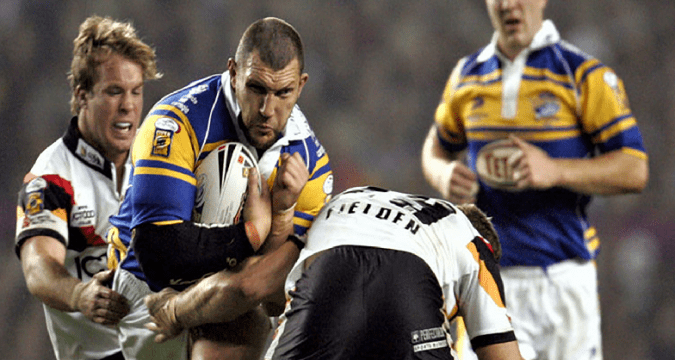
Most mortal beings would struggle to handle a single day in the life of a rugby league player.
The sheer ferocity of a tackle, the brutality of a carry, the inevitable injuries. Even the most experienced, hardened supporter resorts to a grimace during most matches.
Yet for some, it is a way of life. For those that call rugby league a career, they sign up to the repercussions. There are the injuries and their varying restrictions, the general duress inflicted on their body.
Some live this way for years, the most durable can do it for 20 years before hanging up the boots and ending the physical torment.
However, in reality, the challenges never end.
Barrie McDermott spent almost 20 years in the trenches on the pitch. He has the battle scars to prove it. Yet, some 13 years since hanging up the boots, he is still facing the consequences of his playing days.
“I’ve been retired a good few years now but I’m still suffering from the aftereffects of a high-contact collision sport,” says McDermott, who in November had the latest of several shoulder surgeries, required as a result of his days on the pitch over a decade earlier.
“In terms of painkillers and pain relief, I retired at the end of 2006 and I’m still taking tramadol for injuries, I’m still having operations to get me ready for life.
“I want to point out that I don’t blame anybody and if you’d asked me to sign a contract before I’d have signed it. If you’d told me I’d play 400 games and won all I did I’d have still signed it.”
But McDermott is keen to raise awareness of the issues and more so, identify solutions.
One of the biggest issues players face, both during and after their careers, is getting a proper night’s sleep.
“After a game your adrenaline is going that much that it is difficult to sleep. I can recall as a player but certainly after playing too struggling to sleep.
“Some might take to drink to help it, they might take to sleeping tablets. It isn’t as prevalent now but there was a time in the game when there was an under currant of relying on chemicals to get a decent sleep.
“I’ll sound like a dinosaur now but back in my day when we played we would do our rehab, but we’d have a few beers, if we had a big game we wouldn’t do, but that’s how you got to sleep, and even though you might not get to bed until 2 or 3 in the morning you’d still probably get just as much sleep because if you went home and didn’t do anything you’d be sat up.
“Nowadays I can only see that being more intense and extreme. The club I was at in Leeds, I know there were players who really struggled to get any sleep at all. I know people who have suffered and the long-term impact of that erratic cycle of sleep means they can’t find a pattern that works for them. As human beings you need the right amount of sleep, liquid and food. It all contributes to a balanced life, but some really struggle to find that, even years after they’ve stopped playing.
“I’d say it’s a game wide issue, even now. I honestly don’t think we’ve done enough delving into how we can make that better.
“The taboo around the game is that perhaps the club is saying once the whistle has gone and you’ve done your rehab, you’ve got in the car with your wife and kids, you’re free to do what you want between then and getting into training in the morning.
“But the game would do well to look at what players are doing in that time, and how they can be helped.”
The recent development of CBD Oil is a potential, and natural, solution. Toronto Wolfpack launched their own CBD-infused cream last year, a move McDermott supports.
“I think that’s a logical route to go down,” he said.
“I follow other sports in a team environment or individual environment where they’re having to cope with late night performances and lack of sleep.
“It’s an avenue to explore. What is there is something natural. Everyone turns their nose up at hemp, but it’s a natural remedy and we’ve tried a whole manner of natural products included amino acids, protein shakes. You hear CBD and you’re naturally a bit wary of it. But I’ll definitely be trying it.”
